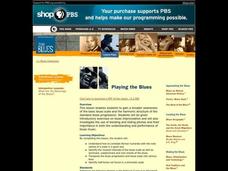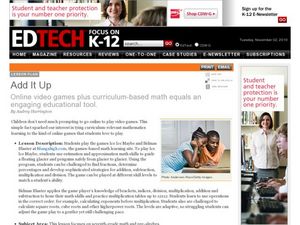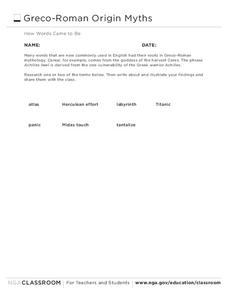Oregon Department of Education
Building Number Sense
It's never too early to begin a child's math education. This collection of fun hands-on activities engage youngsters in building their number sense as they learn how to count objects, identify numerals, compare amounts, and much more.
Virginia Department of Education
Cell Division
Searching for simple ways to teach mitosis to high schoolers? Using colored chalk and onion root tips, pupils visually demonstrate what they view when looking through the lens of a microscope. There are also various ways to expand the...
Newspaper Association of America
The News
Young journalists learn about topics such as newspaper ethics, parts of a newspaper, credible sources, and different types of articles. The lesson empowers individuals and gives them the capability to express their voices through the...
Curated OER
Musical Makeover
Pupils explore the importance of folk music is various ethnic cultures.
Curated OER
Music Education, Playing the Blues
This lesson plan enables students to gain a broader awareness of the basic blues scale and the harmonic structure of the standard blues progression. Students will be given introductory exercises on blues improvisation and will also...
Curated OER
Vocab-u-lous! Build a Fabulous Vocab: Halloween
In this Halloween vocabulary worksheet, students select the best word to complete the sentence. They are challenged by the complex options that all relate to Halloween.
Curated OER
Vocab-u-lous! Build a Fabulous Vocab: Thanksgiving
In this Thanksgiving vocabulary activity, students select the best choice to complete the sentence about Thanksgiving. The activity challenges students with complex words.
Manchester University
Lesson 51: Scientific Notation
Discuss scientific notation with this mathematics lesson. Middle schoolers predict which problem is bigger of two numbers. They analyze the problems by observing the powers of 10 in order to decide which is bigger. This appears to be an...
Curated OER
Coconut-Shell Cup
Students research and discuss the social ritual of drinking chocolate in viceregal Mexico. They explain its cultural and historical and geographical roots. Students create their own "drinking" vessel from papier-mache. They experiment...
Virginia Department of Education
The Writing Process for Expository Writing
Struggling on what steps to take in your expository essay lesson? Or confused on what to include for your scribes? This exercise in the process of expository writing provides concepts and structure for the educator on what the writers...
Curated OER
The Adventures of Huckleberry Finn Packet
Readers of The Adventures of Huckleberry Finn are directed to complete two projects as a part of their study of Mark Twain’s novel. Individuals craft an organized notebook containing all their work during the study, and they...
Curated OER
Online video games plus curriculum-based math equals an engaging educational tool.
Seventh graders use online math games to practice understanding the skill of estimation and order of operations. In this lesson, 7th graders use the internet to play online games to strengthen their understanding of these skills.
Curated OER
Wacky Weed Parts
Students view picture of weed and identify roots, stems, flowers, leaves, and seeds, describe function of each different weed part, and discuss how different parts of weed work together to benefit plant in its new environment.
Curated OER
The History of Dentistry
Students explore about dentistry's ancient roots and modern history. They read a brief history and answer questions on a comprehension work sheet. Also, students explore dentistry by reading the Historical Overview on the History of...
Curated OER
Spheres
High schoolers work algebraic expressions with various types of powers to find the solutions. They Students also become familiar with problems that involve the square roots of numbers. The work should be completed with computational...
Curated OER
Environmentalism: Then and Now
Tenth graders examine the history of the conservation movement and how it relates to contemporary issues. In this Environmental Science lesson, 10th graders research the roots of the environmental and conservation movement and...
Curated OER
Grammar: Adding a Prefix and Suffix
Fourth graders practice adding a prefix and/or suffix to base words. In this spelling review lesson, 4th graders review how to add a prefix and suffix to a word and complete a worksheet demonstrating their learning.
Curated OER
U.S. Population Hits 300 Million
Students read a story about the population in the United States reaching 300 million, and answer vocabulary and comprehension questions about it. In this population lesson plan, student respond to literature by answering questions,...
Curated OER
Man's Continuing Inhumanity to Man
Students explore social justice issues. In this human justice instructional activity, students examine the meaning of words associated with minority groups and investigate genocide throughout history.
University of Minnesota
Beautiful Brain: Brain Inspiration
"Neuroscientists consider Cajal as important to their discipline as Einstein is to physics." The first of four lessons has scholars view Santiago Ramon y Cajal's drawings of neurons. They reflect and respond to the art through writing...
Curated OER
Learning Strategies
Students develop critical thinking skills using questions exploring the Canadian Parliamentary system. The duties of a modern democracy are investigated.
Curated OER
Plants In Space
For this biology worksheet, students grow corn plants in growth pouches as the control group in an experiment on plant growth in microgravity. Then they analyze any differences that occur between Earth-grown and space-grown corn plants.
Curated OER
Test Yourself for Hidden Bias
Students examine their own hidden bias. For this diversity lesson, students link to an Internet website to test their own stereotypes and prejudices. Students discuss how bias is perpetuated in society and determine what they can to...
Curated OER
Greco-Roman Origin Myths
In this Greco-Roman origin myths worksheet, students read a list of 7 commonly used terms. Students research the origin of one or two of these terms and write about and illustrate their findings. Example: atlas, Herculean effort, tantalize.























